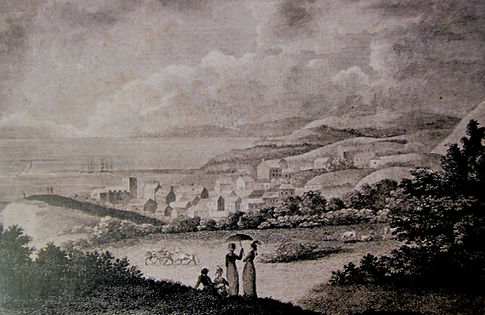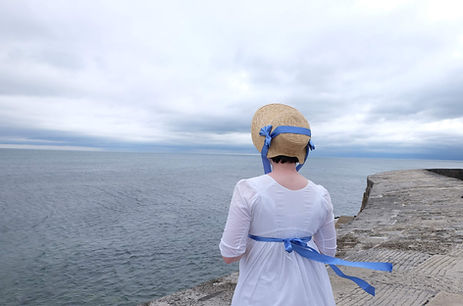

THITHER
for lovers of the work and world of
Jane Austen
Regency

Visiting Lyme Regis
In November of 1803 and September of 1804 Jane Austen went with her sister Cassandra, father and mother to Lyme Regis for their seaside holidays, and it was on these visits that she first discovered and admired the beauties in and around this small seaside town on the the Dorset coast of southwest England.
Much of the Regency town remains, although it seems that the Austens' lodgings mentioned by Jane may have been lost, although they may have once stayed in The Three Cups inn, which still stands. But Lyme's two chief claims to beauty that Jane herself would have known are still there: the Cobb and the coastal cliffs. From Jane's description of Lyme in Persuasion we know she thought it was a beautiful place.

...the Cobb itself, its old wonders and new improvements, with the very beautiful line of cliffs stretching out to the east of the town, are what the stranger's eye will seek; and a very strange stranger it must be, who does not see charms in the immediate environs of Lyme, to make him wish to know it better. The scenes in its neighbourhood, Charmouth, with its high grounds and extensive sweeps of country, and still more its sweet, retired bay, backed by dark cliffs, where fragments of low rock among the sands make it the happiest spot for watching the flow of the tide, for sitting in unwearied contemplation; the woody varieties of the cheerful village of Up Lyme; and, above all, Pinny, with its green chasms between romantic rocks, where the scattered forest-trees and orchards of luxuriant growth declare that many a generation must have passed away since the first partial falling of the cliff prepared the ground for such a state, where a scene so wonderful and so lovely is exhibited, as may more than equal any of the resembling scenes of the far-famed Isle of Wight: these places must be visited, and visited again to make the worth of Lyme understood.
Persuasion
A drawing of Lyme from the early nineteenth century.
Lyme never reached the heights of popularity that Brighton or Worthing enjoyed, but it gained a sort of distinction in the 18th century when it was visited by royalty and Regis was added to it's name. Before that it was a bustling harbor, and in 1645 it saw the beginning of the rebellion by the Duke of Monmouth, who tried to overthrow King James II and take the throne.
But in Jane's day it was a respectable, quiet seaside resort with bathing machines and assembly rooms, where genteel families could come to relax or regain their health. The Austens visited Lyme twice, once in November 1803 and again the next year, and Jane wrote some letters to her sister Cassandra during their second trip that give us an idea of what a Regency seaside holiday was like for an average gentleman's family.
We are quite settled in our Lodgings by this time as you may suppose, & everything goes on in the usual order. The servants behave very well, & make no difficulties, tho' nothing certainly can exceed the inconvenience of the offices, except the general dirtiness of the house & furniture & all its inhabitants. Hitherto the weather has been just what we could wish-the continuance of the dry season is very necessary to our comfort.

Lyme in the 21st century.

Nobody asked me the two first dances; the two next I danced with Mr. Crawford, and had I chosen to stay longer might have danced with Mr. Granville, Mrs. Granville's son, whom my dear friend Miss Armstrong offered to introduce to me, or with a new odd-looking man who had been eyeing me for some time, and at last, without any introduction, asked me if I meant to dance again. I think he must be Irish by his ease, and because I imagine him to belong to the honbl. Barnwalls, who are the son, and son's wife of an Irish viscount, bold queer-looking people, just fit to be quality at Lyme.
Jane attended an assembly with her new acquaintance Miss Armstrong after Cassandra left, and she seemed to enjoy herself and the company. But not so much that she couldn't make a few sharp observations on her fellow assembly-goers.

A view of The Three Cups, where the Austens may have stayed during one of their trips to Lyme.
I called yesterday morning (ought it not in strict propriety to be termed yester-morning ?) on Miss Armstrong and was introduced to her father and mother... We afterwards walked together for an hour on the Cobb; she is very converseable in a common way; I do not perceive wit or genius, but she has sense and some degree of taste, and her manners are very engaging. She seems to like people rather too easily. She thought the Downes pleasant etc etc.
The place in Lyme that seems to draw every visitor is the Cobb, that medieval stone ediface that encircles half the harbor which lent itself so perfectly to a walk. Jane seems to know this from her own experience when she sends her characters in Persuasion for more than one walk on the Cobb. A walk to the end out in the harbor offers a stunning 180º view of the shorline, the town and the sea.


Like most seaside resort towns during the Regency, Lyme offered bathing machines on the beach where visitors could change into bathing garments and then step down into the sea – something Jane apparently enjoyed.
The bathing was so delightful this morning & Molly so pressing with me to enjoy myself that I believe I staid in rather too long, as since the middle of the day I have felt unreasonably tired. I shall be more careful another time, & shall not bathe to-morrow as I had before intended.
 Looking east from the Cobb |  A sunset over the western hills. |
|---|---|
 A view of the coast from Lyme |
If you visit Lyme today it still has those beautiful views, a holiday atmosphere and many fun things to do. But perhaps the greatest charm of Lyme Regis is that it was a place Jane Austen loved and made immortal by the visit of her characters Anne Elliot and Captain Wentworth.
"So much novelty and beauty! I have travelled so little, that every fresh place would be interesting to me; but there is real beauty at Lyme; and in short," with a faint blush at some recollections, "altogether my impressions of the place are very agreeable."
Anne Elliot, Persuasion
